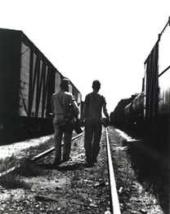Following the harvests provided backbreaking work at starvation wages, and sometimes no wages at all. For three weeks in 1934, Burton Williams, 16, and his brother, Vic, 14, picked cotton for a grower in Elk City, Oklahoma.
"When we told the farmer we were quitting and going home, Burton said, 'You have 35 cents each coming.' That's all we got for three weeks' work."
The Civilian Conservation Corps set up by the Roosevelt government in summer 1933 gave refuge to thousands of boxcar boys in 1,500 forest camps. On a much smaller scale, the National Youth Administration established 50 training camps for girls.
"I begged for dimes on the streets of the French Quarter in New Orleans," said James San Jule, who became a union organizer. in San Francisco. In 1937, he co-authored a pamphlet with John Steinbeck on the plight of migrant workers in California. "I was angry half the time and when I wasn't angry I was sad. Why was this happening to me?
" It was more than a lack of understanding. It was an aimless, discombobulated feeling, as though the world had disappeared. The same feeling you have during an earthquake that's beyond your control.
"You were searching for something and didn't even know what the hell you were looking for. The thought that something was wrong must've crossed my mind but those days I didn't think of it in political terms. I spent so goddamn much time just staying alive."

The era of the boxcar boys and girls passed with the coming of World War II and the end of the Great Depression.
Riding the rails was a rite of passage for a generation of young people and profoundly shaped the rest of their lives. Self-reliance, compassion, frugality, a love of freedom and country are at the heart of the lessons they learned. Their memories are a mixture of nostalgia and pain; their late musings still tinged with the fear of going broke again.
At journey's end, the resiliency of these survivors is a testament to the indomitable strength of the human spirit.
Errol Lincoln Uys
No comments:
Post a Comment